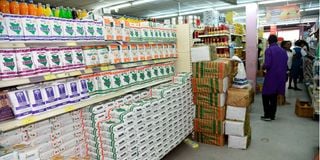Premium
Mixed results for tax waiver on food imports

Maize and wheat flour at a supermarket on Moi Avenue, Mombasa. Food prices have continued to rise in recent months, hitting the pockets of ordinary Kenyans hard.
What you need to know:
- Because of the programme, Treasury has foregone millions of shillings in taxes.
- The government attempted to force traders to import maize at a low market price.
The decision to waive import taxes on at least six food items seven months ago has yielded mixed results, with the cost of some products remaining high.
Recently, President William Ruto announced a fresh round of sugar imports.
State-owned Kenya National Trading Corporation (KNTC) was allowed by the Cabinet to import 150,000 tonnes of rice, 125,000 tonnes of cooking oil, 200,000 tonnes of sugar, 25,000 tonnes of wheat and 80,000 tonnes of beans duty-free.
The approval is effective for one year from January 20, 2023.
In December 2022, Treasury Cabinet Secretary Njuguna Ndung’u gazetted the importation of 900,000 tonnes of white maize duty-free for six months, starting February 1.
The window, which also allowed importation of 600,000 tonnes of milled rice duty-free, expires today, August 6.
Also Read: Why cost of ugali may not drop drastically
The government touted the duty waiver on these items as the cure for high prices.
Usually, an increase in global prices of these commodities pushes local prices up. The situation has been made worse by a weak shilling as this makes imports more expensive.
Because of the programme, Treasury has foregone hundreds of millions of shillings in potential taxes.
The expectation was that food prices would fall and alleviate the suffering of families across the country.
While there have been revelations of influential individuals minting millions of shillings from the imports, the Kenya Kwanza administration has also been on the spot for issuing licences for the duty-free imports to firms that could not deliver and ignoring legitimate businesses.
Appearing at the Senate last month, Agriculture Cabinet Secretary Mithika Linturi said most of the traders given permits to import the commodities failed to do so for lack of money and knowledge.
“The biggest problem they’ve had is financing. It is not cheap and it is not easy to bring in 10,000 tonnes of rice or maize. Commercial banks have stringent rules when assessing customers,” Mr Linturi told senators.
“Most of these customers never had an idea what it would cost.”
The CS added that the ministry approved the importation of 1.4 million tonnes of maize, 1.1 million tonnes of rice and 280,000 tonnes of sugar.
Records at the ministry, however show that of the 1.52 million tonnes of rice whose permits for import were issued to 129 companies, only 530,338 tonnes had made it into the country by June 16.
The Agriculture Ministry recommended the revocation of permits for 23 companies.
Of the 2.5 million tonnes of maize whose permits were issued to 127 firms, just 90,843 tonnes had been imported. The ministry recommended the revocation of permits for 70 companies that delivered nothing.
Mr Linturi told senators that he could not reprimand the traders who failed Kenyans at their time of need.
“I only understand why they could not bring in the items as they had applied. I may in future exercise greater caution when allowing these companies to import anything,” he said.
While the Cereal Millers Association (CMA) has remained silent regarding its participation in importing duty-free maize, a source told the Sunday Nation that less than 15 per cent of the gazetted 900,000 tonnes of maize has been imported, even as the waiver period ends this month.
“The programme was flawed from the start when the government issued permits to traders who did not understand what they were to do and millers left out,” the source said.
“Those given licences could not source or afford to import the maize. The government was forcing traders to import the maize at Sh4,200 for a 90-kilo bag when the global market price was at least Sh5,600.”
There have been reports of some of the imported grains under the programme being of poor quality and posing a risk to consumers but the Kenya Bureau of Standards (Kebs) says it subjected them to tests.
“Duty-free products under the above-mentioned gazette notices were subjected to conformity assessment...and were cleared into the country on the basis of their compliance to the requirements of the relevant Kenya standards or approved specifications,” Kebs said.
A Sunday Nation analysis shows that prices of half of the six products – sugar, maize flour and beans – have actually shot up.
The price of sugar has risen sharply, with some attributing this to the decision by the government to suspend local milling for four months until November 30.
“Prices have risen globally due to low expected output in the 2022/23 season in India, Thailand, China, South America and the European Union,” the CBK said.
“India has restricted sugar exports to cater for domestic demand.”
A kilo of sugar was retailing at an average of Sh211.57 in July – a 33.3 per cent increase from Sh158.66 in January, according to the Kenya National Bureau of Statistics.




